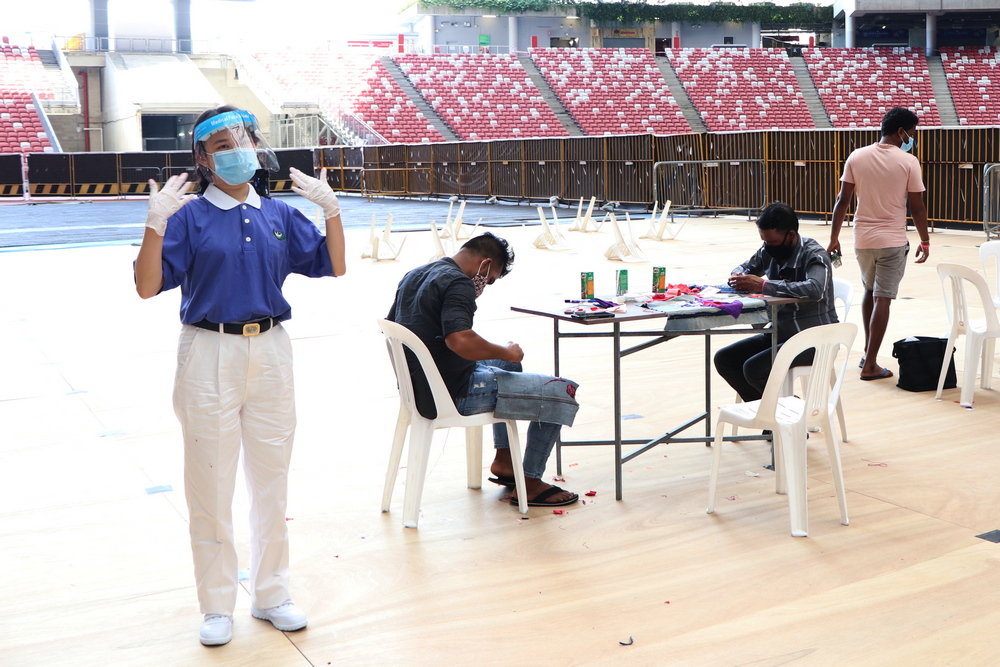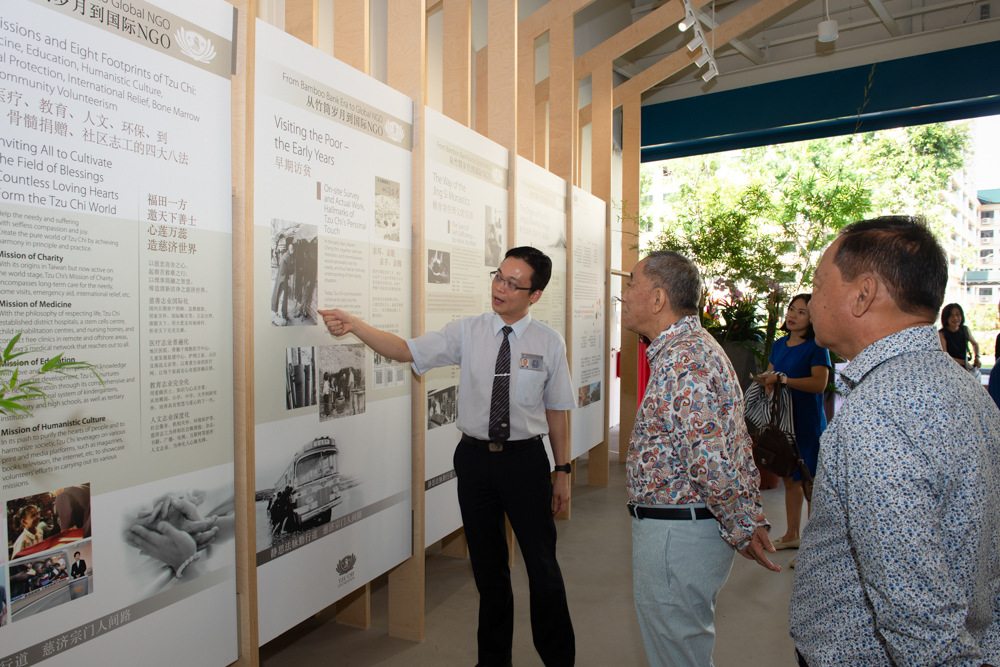
Migrant workers wishing Singapore a Happy 55th National Day with their patchwork. (Photo by Mulias)
“Happy Birthday, Singapore!”
Over 40 migrant workers, dormitory administrators and volunteers had wished Singapore a happy 55th anniversary on top of their voices in front of the camera. Their loud voices that echoed throughout the National Stadium were responded by hundreds of migrant workers in the stadium with a loud “Yeah!”.
With a capacity of 55 thousand spectators, the National Stadium is the largest stadium in the country. Situated in Singapore Sports Hub, the National Stadium was the venue for various mega entertainment events and international sports events such as the Southeast Asian Games. On 17 April, Singapore recorded a total of 5,050 COVID-19 cases, of which 90% were migrant workers. To contain the spread of the disease within dormitories, the National Stadium vacated its closed facilities to be converted into a temporary dormitory for migrant workers. Migrant workers who have been tested negative are relocated here to help them maintain safe social distancing with others.
As the pandemic worsens, thousands of migrant workers have moved into the National Stadium and live in different zones separated by canvas. In each zone, each camping tent is a single bedroom for each migrant worker. Apart from their usual daily routines, the migrant workers can only spend time surfing the internet using the free wireless network and occasionally take turns walking around the lawn near the National Stadium for some sunlight. Such recurring lifestyle had continued for three months until one day, a team of volunteers entered the National Stadium, bringing along with them needles and threads.
Bonding through sewing
In the afternoon of National Day eve, volunteers from Tzu Chi Foundation (Singapore), 3Pumpkins and Singapore International Foundation lined up at the entrance of the National Stadium to welcome 24 migrant workers of Indian and Bangladeshi nationality for the “Stay Home Quilt” art project (Note). Everyone was masked up and sat at the centre of the National Stadium. Under the hot weather, many were perspiring as they sewed. While some of the migrant workers were very focused on their sewing, others chatted with the volunteers during the sewing session.
The objective of this art project is to let the migrant workers express their feelings and take their mind off negative thoughts. Singapore International Foundation is one of the supporting partners of this project. By bringing in different communities to participate in this activity together, the organization hopes to thank the migrant workers for their years of contribution to Singapore.
"I enjoyed the whole process very much and I was able to slow down and reflect on myself," shared Singapore International Foundation’s representative, Wendy Ng. She finds this event a good opportunity to communicate with migrant workers. It was a rare opportunity for different community groups to foster mutual understanding and get closer to each other at heart. She hopes that the migrant workers could reunite with their families as soon as the pandemic is over.
The person in charge of 3Pumpkins, Lin Shi Yun had arranged to play some Tamil and Bengali songs to keep the ambience light and easy. Some migrant workers happily selected some songs of their choice to be played while others started singing using a microphone.
“We all miss Home”
“I miss my family” is the theme of patchwork sewed by a few migrant workers sitting at the same table. The same sentiment is shared by Tzu Ching (Tzu Chi youth) Amelia Gunawan from Surabaya, Indonesia. Amelia, who has just graduated from the National University of Singapore used to go home every semester. However, due to the ongoing pandemic, she can now only video call her family every day during her semester break.
“I felt that I had to do something when I saw so many migrant workers infected,” said Amelia. Without hesitation, she signed up to volunteer for the project after she saw the event on Instagram. With no experience of interacting with any South Asian migrant worker, Amelia felt a bit uncomfortable at first. However, she was able to integrate into the group after receiving some positive responses from them. Amelia praised the migrant workers for sewing better than her and she hoped that they would stay positive during the remaining quarantine period.
Another volunteer who had also found out about this event through Instagram is Keerthiga Ashwini. She happened to be in the same group with two Indian migrant workers during the sewing session. Since Keerthiga speaks Tamil, she communicated with the Indian workers without any issue. They had a good time chatting with each other and 3 hours passed without anyone realizing. It was a meaningful event to Keerthiga.

Volunteer Chua Sock Peng chats with Thangavelu, a migrant worker from India, as if they were old friends. (Photo by Bernard Ng Jia Han)

A gift by Thangavelu to his daughter. (Photo by Bernard Ng Jia Han)
Migrant workers and volunteers had a good time chatting with each other
Two third of the participants in this second sewing session were there for the second time. When the first event was held on 30 July, volunteer Chua Sock Peng could clearly remember the creativity of the migrant workers and how much they miss their family. Thangavelu Rajasekaran, a migrant worker whom she accompanied, had sewn the shape of his daughter using different fabrics. Upon seeing this, Chua sewed a red heart and a pair of shoes for Thangavelu so that he could include the heart on his patchwork and complete it on time.
As a native Singaporean, Chua is very grateful for the contributions of the migrant workers. She said, “Without these migrant workers, how many Singaporeans would be willing to do these construction work? I think that the migrant workers should be treated equally. They did not have much choice; we should treat them as part of our family.”
“She is very cute and pretty and brings a lot of joy to our family. Everyone said that my daughter is very active and naughty,” said Thangavelu with a smile on his face as he described his one-year-old daughter, Moshika. Thangavelu who hails from India has worked in the construction industry for nine years. He gave a positive comment about the sewing event as it helped everyone to relax their mind. He also commented that the singing session had made everyone very happy.

Dormitory administrator, Azan (middle) is touched by the patchwork made by Rengasamy. (Photo by Bernard Ng Jia Han)

Some migrant workers are taking turns to sing for everyone. (Photo by Bernard Ng Jia Han)
Time to say goodbye
Muhammad Azan bin Jaafar is one of the dormitory administrators responsible for taking care of these migrant workers for two months. He choked and said, “I am very happy because the migrant workers told me that they are very happy to be given this opportunity to be creative. They can express their feelings through the arts, which is very touching because the services that you provide are from the heart, and you are spending time doing charity work because of the migrant workers.”
As a Muslim, Muhammad Azan bin Jaafar actively participates in the Inter-Religious Organizations activities, which gave him a bit of exposure to Buddhism. He said, “We do not know when we will be needing the help from others. In the religious vocabulary, there is this word called ‘karma’, by helping the poor, someday the poor will also help us.”
Another migrant worker from India, Rengasamy Kannaperan expressed how he misses his parents and sister on his patchwork. Upon seeing the work of Rengasamy, Azan couldn't contain his own sadness when he recalled that he could not visit his relatives in Malaysia, Indonesia and Brunei during Eid al-Fitr this year. After getting along with each other for two months, the dormitory workers have established a deep relationship with the migrant workers.
Before the event came to an end, everyone held their finished product that took them three hours to complete. To express their love for this garden city, migrant workers had sewn words like "I Love SG 55" and "NDP2020" (National Day Celebration 2020) on their patchworks. There were also messages like "Miss u Amma, Sister" (mother and sister, I miss you) by those who miss their family and "I Love you My Sister, Pink Zone" as a gift to the administrators of the dormitory to thank them for their care.
COVID-19 testing for all migrant workers in dormitories was completed on 8 August. The 2000 migrant workers who stayed at the National Stadium have slowly returned to work and moved to new dormitories. All these marked the closure of Tzu Chi Singapore’s “Stay Home Quilt” art project at Singapore Sports Hub. The patchworks of these migrant workers are now on display at the Tzu Chi Humanities Youth Centre until the end of the year.

Volunteers and migrant workers waving goodbye to each other before parting ways. (Photo by Mulias)
Note:
The lead artist of this project is Jimmy Ong. The project is organized by Tzu Chi Humanistic Youth Centre and 3Pumpkins, sponsored by Maybank Singapore, and supported by Singapore International Foundation, The Majurity Trust, PAssionArts in Nee Soon GRC, Chong Pang Community Arts & Culture Club, and Nee Soon East Community Arts & Culture Club.








